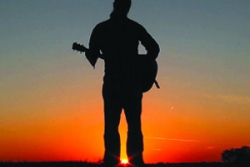
When Culver City filmmaker and producer Brian Hardin left to Kansas in September of 2013, he was planning for a 10-day trip to record Jonathan Fleig’s new album “Road to Nowhere.” But business trip became more than recording session and kept Harding away for more than a month. The result was the production of an album and a music documentary also titled “Road to Nowhere.”
“This isn’t a concert DVD; it just includes live music,” Hardin said. “This is a film about helping you evolve and helping people to make a change in their life to overcome their struggle.”
Prior to the trip to Kansas, Hardin and Fleig had never met before despite having worked on recording projects over the Internet for several years. The two would speak on the phone, giving Hardin the sense of what a nice person Fleigh was and with the notion that some day the two would meet.
“He (Fleig) called me one day in September, out of the blue,” Hardin said. “I asked him what was going on in his head that he had all these songs written and recorded. That is when he said he was at the lowest point in his life: I told him that it sounded like I needed to get out there now.”
The difficulties that Fleig was experiencing ranged from having his band not get along, to having to move back to Kansas from San Diego, to even being in conflict with his wife and best friend: all around the time that his father died. Despite Fleig’s notion that he was at the lowest point in his life, Hardin was convinced that it was the perfect time to record the album.
“We needed to record that album right away,” Hardin said. “I wanted to shoot video of him as he recorded the album. When he said that he didn’t have the money, I told him to just believe in magic and that it would happen.”
Later that night Fleig received a call form a friend. When Fleig’s friend learned that the plans to record an album were being stalled due to the lack of money, the friend provided the funds. Still, there weren’t enough resources for a recording studio, so it was decided to shoot outside.
“I have been a recording engineer all my life; I have recorded more than 120 records so recording music is easy, even in the rain, wind or with kids playing in the background,” Hardin said. “I recorded the whole album, outside, live in one take while the band was standing in a circle facing each other.”
Shot at eight different locations around Kansas and a few in California, the entire album was recorded outdoors. As the album was being recorded, Hardin set up cameras all around the band as they performed. Hardin manned one camera and later took to the task of editing all of the live video footage to create the documentary.
“We just did incredible recordings that were impossible for most people to do,” Hardin said.
Throughout the recording sessions Hardin made it a point to remember three questions raised by Fleig: Why are we here? What are we doing? And, what is all this for? Fleig’s album was the overall project but overcoming those doubts and concerns were at the core of what both Hardin and Fleig were attaining achieve.
“That is why I went there: I knew that in the process of us recording the music and me shooting the video of everything, I would have these interviews with him and we would end up working together to help him overcome his problems,” Hardin said. “That is what happens: he overcomes all of his struggles. There are spiritual lessons in this film helping the viewer to evolve but it isn’t done in a preachy way.”
The 45-day process was not one to just help Fleig, as Hardin believes that he walked away from the project having evolved as a person, himself.
“The hard part was getting him to evolve. It was exhausting but we evolved,” Hardin said. “I thought I was going there to save him but I was there to save myself. I had two friends died that year so I was going through the exact same issues of dealing with the loss of a loved one. I needed to work through my issues. I am not the one on camera but I am the one understanding what he is going through. So as I was evolving myself; it took me 45 days to evolve.”
“We were working on the film everyday and working on ourselves,” Hardin said. “It was a lot of sunsets, a lot of conversations and a lot of crying. As an artist, you have to feel.”
The film has been submitted to the Culver City Film Festival and the Marina del Rey Film Festival, as well as South by Southwest and many others.
For the full interview, persons interested can visit: http:// youtu.be/dkr2yEF0jgY.
To learn more about the film, persons interested can visit: www.roadtonowherefilm.com or www.jonathanfleig.com for the album.
